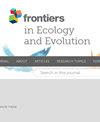旅游、科学数据和纯粹欣赏之间的自然观察
IF 2.4
3区 环境科学与生态学
Q2 ECOLOGY
引用次数: 0
摘要
自然观察是自然旅游和公民科学的核心。与 "科维德-19 "大流行相关的行动限制为旅游业的衰退创造了机会,但在线公民科学平台却主要通过发布 "后院 "观察结果而蓬勃发展。除了公民科学之外,在此期间回归自然似乎对支持心理健康(尤其是城市居民的心理健康)也很重要,这使得人们对自然欣赏的研究重新产生了兴趣。在这里,我试图将自然观察研究的这些不同方面汇集在一起,这些方面由不同的哲学基础定义,并遵循不同的方法论。我利用旅游和公民科学研究的结果来总结观察者的动机,并将其置于自然欣赏的框架中。我认为这个框架可用于保持不同目标之间的平衡:在公民科学中减少观察者的偏见,在以自然为基础的旅游业中增强观察者的体验,以及最大限度地提高接触自然的治疗效果。本文章由计算机程序翻译,如有差异,请以英文原文为准。
Nature observations between tourism, scientific data and pure appreciation
Nature observations are at the core of both nature-based tourism and citizen science. The movement limitations associated with the Covid-19 pandemic have created a window during which tourism nose-dived, but online citizen science platforms flourished primarily through the posting of ‘backyard’ observations. Beyond citizen science, a return to nature during this period appears to have been important in supporting mental health, especially in city dwellers, and this has resulted in a renewed interest in studying nature appreciation. Here I attempt to bring together these different facets of nature watching research, defined by divergent philosophical underpinning and following different methodologies. I use the findings of tourism and citizen science studies to summarize observer motivations, and place these in a nature appreciation framework. I argue that this framework can be used towards maintaining a balance between diverse goals: reducing observer biases in citizen science, enhancing observer experience in nature-based tourism, and maximizing the therapeutic effects of being exposed to nature.
求助全文
通过发布文献求助,成功后即可免费获取论文全文。
去求助
来源期刊

Frontiers in Ecology and Evolution
Environmental Science-Ecology
CiteScore
4.00
自引率
6.70%
发文量
1143
审稿时长
12 weeks
期刊介绍:
Frontiers in Ecology and Evolution publishes rigorously peer-reviewed research across fundamental and applied sciences, to provide ecological and evolutionary insights into our natural and anthropogenic world, and how it should best be managed. Field Chief Editor Mark A. Elgar at the University of Melbourne is supported by an outstanding Editorial Board of international researchers. This multidisciplinary open-access journal is at the forefront of disseminating and communicating scientific knowledge and impactful discoveries to researchers, academics and the public worldwide.
Eminent biologist and theist Theodosius Dobzhansky’s astute observation that “Nothing in biology makes sense except in the light of evolution” has arguably even broader relevance now than when it was first penned in The American Biology Teacher in 1973. One could similarly argue that not much in evolution makes sense without recourse to ecological concepts: understanding diversity — from microbial adaptations to species assemblages — requires insights from both ecological and evolutionary disciplines. Nowadays, technological developments from other fields allow us to address unprecedented ecological and evolutionary questions of astonishing detail, impressive breadth and compelling inference.
The specialty sections of Frontiers in Ecology and Evolution will publish, under a single platform, contemporary, rigorous research, reviews, opinions, and commentaries that cover the spectrum of ecological and evolutionary inquiry, both fundamental and applied. Articles are peer-reviewed according to the Frontiers review guidelines, which evaluate manuscripts on objective editorial criteria. Through this unique, Frontiers platform for open-access publishing and research networking, Frontiers in Ecology and Evolution aims to provide colleagues and the broader community with ecological and evolutionary insights into our natural and anthropogenic world, and how it might best be managed.
 求助内容:
求助内容: 应助结果提醒方式:
应助结果提醒方式:


